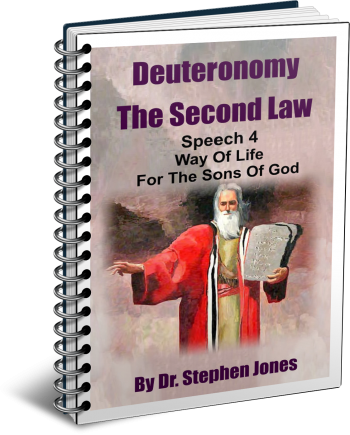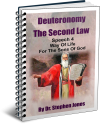Latest Posts
View the latest posts in an easy-to-read list format, with filtering options.

A commentary on the fourth speech of Moses in Deuteronomy 14-16. The book of Deuteronomy is a series of 12 speeches that Moses gave just before his death at the end of Israel's wilderness journey.
Category - Bible Commentaries

After giving instructions regarding the observance of Passover, Moses then speaks of the Feast of Pentecost, for the sons of God were to progress from the faith of Passover into the baptism of the Holy Spirit, given at Pentecost. This second feast is called the Feast of Weeks, in Deut. 16:9-12,
9 You shall count seven weeks for yourself; you shall begin to count seven weeks from the time you begin to put the sickle to the standing grain. 10 Then you shall celebrate the Feast of Weeks to the Lord your God with a tribute of a freewill offering of your hand, which you shall give just as the Lord your God blesses you;
The count begins on the day that they began “to put the sickle to the standing grain.” This was the day that the priest waved the first fruits offering of barley in the temple on the first Sunday after Passover. In Lev. 23:14 the people were commanded not to eat of the new crop of barley before this first fruits offering. But here in Deuteronomy 16, Moses said that they were not even to harvest their barley until the first fruits had been offered to God.
At any rate, this day, commonly called Easter today, was the first day of a seven-week count of days toward Pentecost. For this reason, it was called the Feast of Weeks. The term Pentecost is its Greek equivalent (by inclusive reckoning), for it means “the fiftieth day.” So Pentecost was always celebrated seven weeks after the wave-sheaf offering. Since the sheaf of barley was waved on a Sunday, Pentecost too always fell on a Sunday.
Pentecost marked the day when God spoke to Israel from the midst of fire on the Mount, and all heard the Ten Commandments. Yet because the people in that day refused to hear the rest of the law, insisting that Moses hear God and then tell them what God had said, the blessing of Pentecost was postponed until after Christ’s death and resurrection.
Whereas the wave-sheaf offering was of barley, the Pentecostal offering of two loaves of bread were made with wheat (Ex. 34:22). Another contrast is that the barley was waved during a time of unleavened bread, whereas the Pentecostal offering was offered with leaven (Lev. 23:17).
Barley, then, represents incorruptible people, beginning with Christ Himself, whereas wheat represents corruptible believers that are in need of discipline to write the law in their hearts. The only reason that the wheat company is acceptable to God is because, like the wheat bread, they are baked in the fire—the baptism of fire (Luke 3:16).
Each day during the seven-week interval between these feasts, the people were to “count the omer.” The Hebrew word for “sheaf” is omer, which is also a measure of capacity equal to a tenth of an ephah, or about two liters. It was customary to divide the omer of barley into fifty small piles and count one pile each day until Pentecost.
This reminded them of the sheaf that had been waved on the first day and instilled in them an anticipation of Pentecost, thus linking the two festivals in a cause-and-effect relationship. As Christian believers, we understand that the wave-sheaf offering was fulfilled by the pre-dawn resurrection of Christ, followed by His presentation to the Father in the Temple in heaven at the third hour of the day. This presentation, as we have already shown, occurred on the eighth day of the week, according to the law in Ex. 22:30.
The second presentation of the sons occurred on Pentecost, which was also on an eighth day, but seven weeks later. Pentecost was fulfilled in Acts 2 when the Holy Spirit was poured out as rain and fire upon the disciples’ heads.
Counting the omer of barley was meant to teach the people to anticipate the coming of the Holy Spirit. In fact, the Hebrew word omer is a prophetic picture in itself. It is spelled ??? (ayin-mem-resh). The ayin (?) literally means “eye,” and it signifies seeing or watching for something. The mem (?) literally means “water,” and the resh (?) literally means “head.”
Thus, as the people counted the omer, they were really watching for water on the head—that is, they anticipated the outpouring of the Holy Spirit as rain being poured out from on high. Joel 2:28 and 29 says,
28 And it will come about after this that I will pour out My Spirit on all mankind; and your sons and daughters will prophesy, your old men will dream dreams, your young men will see visions. 29 And even on the male and female servants I will pour out My Spirit in those days.
Isaiah 32:15 echoes this, saying,
15 until the Spirit is poured out upon us from on high, and the wilderness becomes a fertile field and the fertile field is considered a forest.
If the people had understood what they were doing, they would have known the manner of the fulfillment of Pentecost. They would have known what the Israelites under Moses missed by refusing to hear His voice, and perhaps they would have been more careful to hear the voice of Jesus Christ, who said in John 10:27,
27 My sheep hear My voice, and I know them, and they follow Me.
Pentecost, then, is for those who hear the voice of God (in Jesus Christ). The foundational purpose of Pentecost is for Jesus Christ to call His sheep. His sheep hear and follow Him into the baptism of fire, which is designed to kill the leaven in their lives and prepare them for the Feast of Tabernacles, through which they must receive their inheritance.
Unfortunately, not everyone accepts the feast of Pentecost as a requirement to progress in one’s relationship with Christ. Many are satisfied to be justified by faith and even believe that Pentecost ceased 1900 years ago. But Pentecost is the way of life for the sons of God, for it is God’s great training ground to hear the voice and to be led by the Spirit. It is the path of wilderness testing, by which the sons of God offer their hearts to God as the first-fruits of the wheat, so that God can baptize them with fire to kill all leaven in their lives.
This is how God prepares His sons for the feast of Tabernacles.
Moses then continues in Deut. 16:11 and 12,
11 and you shall rejoice before the Lord your God, you and your son and your daughter and your male and female servants and the Levite who is in your town, and the stranger and the orphan and the widow who are in your midst, in the place where the Lord your God chooses to establish His name. 12 And you shall remember that you were a slave in Egypt, and you shall be careful to observe these statutes.
Even though the Pentecostal loaves of bread were to be baked in the fire to deal with the leaven, the people were to “rejoice always” (1 Thess. 5:16). The sons of God were to follow Jesus, who went to the cross, not grudgingly, but with joy (Heb. 12:2). Paul links all of these concepts together in 1 Thess. 1:6, saying,
6 You also become imitators of us and of the Lord, having received the word in much tribulation with the joy of the Holy Spirit.
The Feast of Pentecost is for all—not just men, not just masters, not just fathers, not just Israelites. The blessings of Pentecost were to come upon “all flesh” (Joel 2:28, KJV). This also included the “strangers” or aliens in their midst, a truth that surprised Peter when the Spirit came upon Roman soldiers—the very people who had occupied and oppressed Judea. In Acts 10 we read how Peter was called to the house of Cornelius, the Roman centurion, to preach the Gospel.
44 While Peter was still speaking these words, the Holy Spirit fell upon all those who were listening to the message. 45 And all the circumcised believers who had come with Peter were amazed, because the gift of the Holy Spirit had been poured out upon the ethnos also. 46 For they were hearing them speaking with tongues and exalting God…
Peter and his circumcised friends should not have been surprised at this, because the Holy Spirit had already come to a city of Samaria. In Acts 8 the Apostle Philip was the first to preach the Gospel in Samaria, and when the people believed, he sent for Peter and John. Acts 8:17 says,
17 Then they began laying their hands on them, and they were receiving the Holy Spirit.
If the Judeans had understood Moses’ words in Deut. 16:11, they would not have been surprised at the generosity of God. Unfortunately, they were raised in a culture that believed the promises of God were given to genealogical Israelites only. For this reason it surprised them when God unexpectedly poured out His Spirit upon other people who believed—even the hated Romans who were part of the iron beast kingdom of Dan. 7:7 and who were deemed to be God’s enemies.
Moses granted Pentecost even to the strangers among them. He reinforced this in verse 12 by reminding Israel that they too had been strangers in the land of Egypt. Even as they had wished the Egyptians would grant them impartial justice and equal rights without oppression, so also should Israelites grant strangers the same treatment.
God’s example of generosity, sharing the inheritance of the Holy Spirit with all flesh, ought to be our example. Paul says that “the saints will judge the world” (1 Cor. 6:2). To do this requires the same global view that God has, for God will not set up any man to judge those that he does not love.
Hence, the sons of God are to exhibit the love of Christ, foretold in the law and manifested in the life and teaching of Jesus.